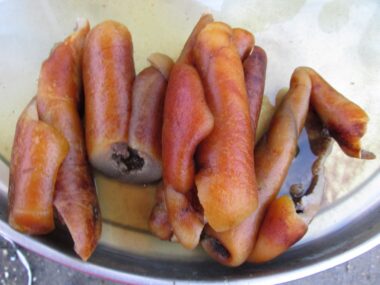African Salad, also known as Abacha or African Abacha Salad, is a traditional Nigerian dish with roots in the Igbo culture of southeastern Nigeria. This vibrant and refreshing salad is made from shredded cassava (also known as Abacha), mixed with an array of vegetables, proteins, and aromatic spices, all tossed in a flavorful dressing of palm oil, onions, and spices.
In this essay, we will delve into the origins of African Salad, its ingredients, preparation methods, and cultural significance, highlighting its role as a beloved delicacy in Nigerian cuisine.
Origins of African Salad
African Salad has its origins in the Igbo community of southeastern Nigeria, where cassava is a staple crop and forms the basis of many traditional dishes. The name “Abacha” refers to the shredded cassava used as the main ingredient in the salad.
Over time, African Salad has evolved into a versatile and beloved dish enjoyed across Nigeria and beyond, with variations in ingredients and preparation methods reflecting regional preferences and culinary creativity.
Ingredients of African Salad

- Shredded Cassava (Abacha): The star ingredient of African Salad, cassava is peeled, boiled, and shredded into thin strips, providing a hearty and satisfying base for the salad.
- Vegetables: Common vegetables used in African Salad include shredded cabbage, carrots, bell peppers (red, green, or yellow), onions, and tomatoes, adding colour, texture, and freshness to the dish.
- Proteins: African Salad often includes assorted proteins such as cooked or smoked fish (such as mackerel or catfish), dried shrimp, crayfish, or boiled eggs, enhancing flavour and nutritional value.
- Palm Oil: The dressing for African Salad is typically made from palm oil, a rich and flavorful oil derived from the fruit of the oil palm tree. Palm oil adds a distinctive colour and richness to the salad, as well as a subtle nutty flavour.
- Spices and Seasonings: A variety of spices and seasonings are used to flavour African Salad, including ground crayfish, ground chilli peppers (such as cayenne or scotch bonnet), salt, and sometimes bouillon cubes or seasoning powders.
Preparation of African Salad
- Prepare the Cassava: Peel and boil the cassava until tender, then shred it into thin strips using a grater or a special tool called an Abacha slicer. Rinse the shredded cassava in cold water to remove excess starch, then drain well.
- Prepare the Vegetables: Shred the cabbage, carrots, and bell peppers into thin strips. Chop the onions and tomatoes into small pieces.
- Prepare the Proteins: If using fish, remove the bones and skin, then flake the flesh into small pieces. Boil the eggs until hard-boiled, then peel and slice them.
- Make the Dressing: In a small bowl, combine the palm oil with chopped onions, ground crayfish, ground chilli peppers, salt, and any other desired spices or seasonings. Mix well to combine.
- Assemble the Salad: In a large mixing bowl, combine the shredded cassava, vegetables, proteins, and dressing. Toss gently to coat everything evenly with the dressing, taking care not to crush the delicate ingredients.
- Serve: African Salad is typically served chilled or at room temperature, garnished with additional chopped onions and tomatoes, and sometimes sprinkled with extra ground crayfish or chilli peppers for added flavour and heat.
Cultural Significance of African Salad
African Salad holds significant cultural importance in Nigerian cuisine, particularly in the Igbo community, where it is often served at special occasions, celebrations, and festive gatherings. It is a dish that brings people together, symbolizing unity, hospitality and shared enjoyment of good food.
African Salad is also a popular street food and market snack, enjoyed by people of all ages as a tasty and satisfying treat.
Health Benefits of African Salad
African Salad is not only delicious but also nutritious, offering a wealth of health benefits:
- Cassava: Cassava is a good source of carbohydrates, fibre, vitamins, and minerals, providing energy and supporting digestive health.
- Vegetables: The vegetables in African Salad are rich in vitamins, antioxidants, and dietary fibre, promoting overall health and well-being.
- Proteins: The proteins in African Salad, such as fish, eggs, and shrimp, provide essential amino acids for muscle growth, repair, and maintenance.
- Palm Oil: While palm oil is high in saturated fats, it also contains beneficial nutrients such as vitamin E and beta-carotene, which have antioxidant properties and support skin health.
Conclusion
African Salad, or Abacha, is a delightful and flavorful dish that celebrates the vibrant culinary traditions of Nigeria, particularly the Igbo culture of southeastern Nigeria. Made with shredded cassava, vegetables, assorted proteins, and a savoury palm oil dressing, African Salad is a feast for the senses, combining textures, flavours, and colours harmoniously and satisfyingly.
Whether enjoyed at a festive gathering, as a street food snack, or as a comforting home-cooked meal, African Salad embodies the warmth, hospitality, and culinary creativity of Nigerian cuisine, inviting people to come together and savour the joys of good food and good company.
Related Tags
Taiwo Olawuyi
Taiwo Olawuyi is a highly dedicated and passionate professional blogger, renowned for her ability to create captivating, informative, and engaging content in the realm of health and wellness. She holds a Bachelor's degree in Political Science from Olabisi Onabanjo University and a Master's degree in Adult Education from the prestigious University of Ibadan. Her profound passion for health and wellness, coupled with her unwavering dedication to her audience, serves as a constant source of inspiration and enlightenment for readers worldwide.










